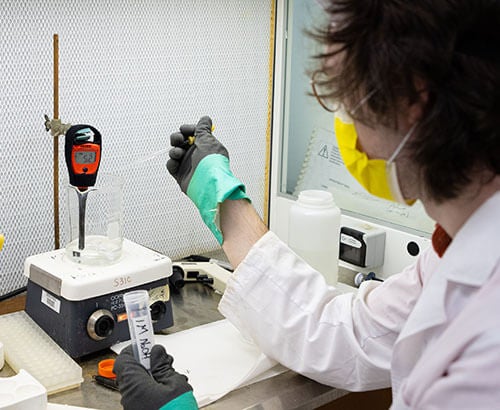Starting in the fall of 2020, a collaboration of Marshall programs began working together to collect and test campus wastewater for the SARS-CoV-2 virus. Dr. Chuck Somerville, the dean of the College Science, was among a group of Marshall University employees that became aware of a program being used at municipalities across the country that would test municipal wastewater as a predictor for clinical outbreaks of the disease. The idea was that if a residence hall waste stream tests positive for Sars-Cov 2, campus safety could monitor those facilities.
From there, a plan was hatched. Travis Bailey, director of the physical plant, could collect the samples; David Neff, a technician in the chemistry department, could prep the samples for amplification; and Dr. Daniel Brazeau, an associate professor in the School Medicine and School of Pharmacy, and Jason Chute, DNA technical leader in forensic science, both had the equipment and experience to perform the genetic testing of the samples. Sampling started in October of 2020 for the project.
 Autosamplers were set up to collect samples in the morning. Samples were taken back to the lab and run through purification to remove chemicals. Sars-Cov-2 RNA was isolated by the Forensic Science center. Prepared samples were then taken to the School of Pharmacy for detection of Sar-Cov-2 using standard CDC guidelines.
Autosamplers were set up to collect samples in the morning. Samples were taken back to the lab and run through purification to remove chemicals. Sars-Cov-2 RNA was isolated by the Forensic Science center. Prepared samples were then taken to the School of Pharmacy for detection of Sar-Cov-2 using standard CDC guidelines.
The project is already paying dividends in the surveillance of the virus and as a teaching opportunity in state-of-the-art genetic testing procedures. Students have been brought into the project in several ways from lab work to recordkeeping and methods development. Among the students participating in the lab work is Holden Young, a freshman from Huntington, who works in the lab.
“It’s a great opportunity, to be able to be a part of the project and learn hands on things that we’re talking about in class, Young said. “It lines up very well with the learning environment.”
The other students involved in the project are Cyrus Falsafi, a senior, and Tabby Collins, a junior. Somerville says collecting data in this kind of system can allow for institutions to prepare ahead of time before a surge can overwhelm.
“It can allow for the moving of PPE or medical equipment where it will be most needed,” Somerville said. “Institutions will know where to ramp up testing, what can be open and what can be closed.”
Somerville says they’d like to develop a system that can be used past the testing for presence of the SARS-CoV-2 virus.
“We would like to have a system that not only provides information on this pandemic, but helps the state manage the next emerging infectious disease,” Somerville said.
After running samples for a few months on a small-scale level, the Marshall team was contacted by the West Virginia Department of Health and Human Resources (WV DHHR) to collaborate on a larger project of surveillance monitoring at the state level. The WV DHHR is seeking funding for the project. The hope is to create a program that could give lead time for the state to prepare for surges in cases.
The project has been valuable in helping the team to learn how to conduct this type of research quickly and accurately. The project is still in the developmental stage and officials continue to work with biosafety officials on how the research can be conducted safely.
—————
Photos: (Above) Holden Young calibrates the pH meter for use in processing wastewater samples. (Below) Holden Young prepares a wastewater sample.

